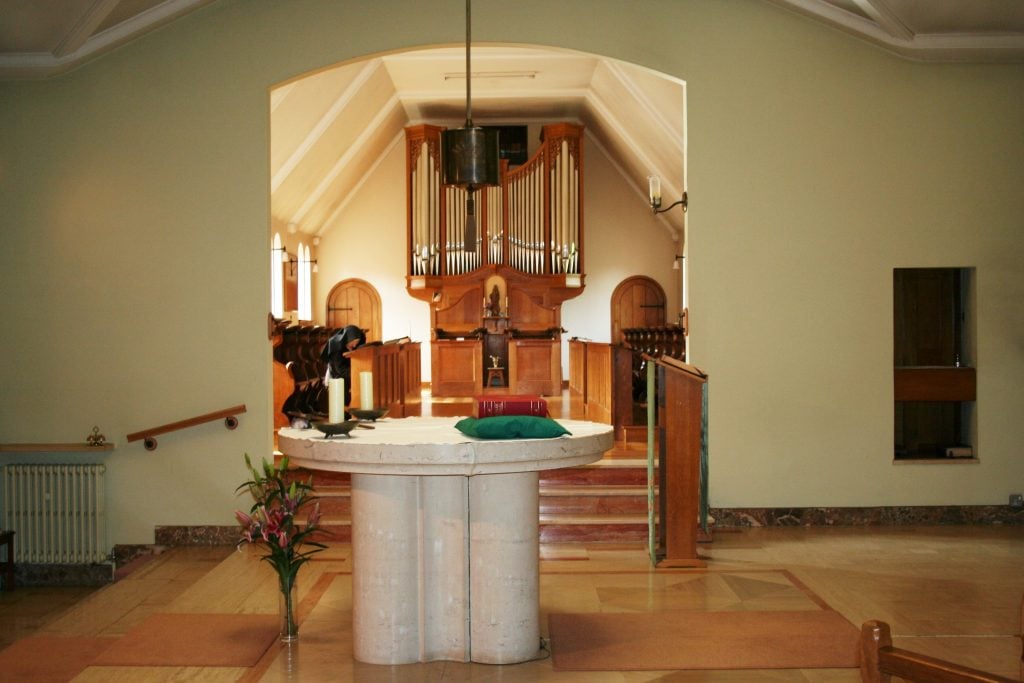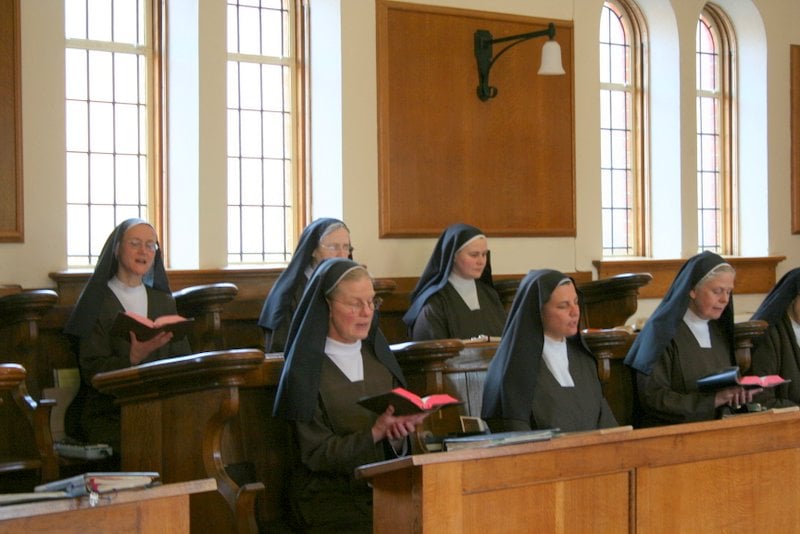LITURGY
At the heart of each day lies the Liturgy: the daily celebration of the Mass and Divine Office. The Eucharist – our “daily bread” – is the centre and inspiration of our community life and prayer. Gathered together each morning to listen to the Word of God, to offer and receive forgiveness and peace, and to share the sacramental meal of the Lord’s body and blood not only creates a bond of union between us but is an enactment of what it means to be a Christian community. It is here we draw the strength we need to pursue our vocation faithfully.
DIVINE OFFICE
The Divine Office is the name given to the seven periods of common worship that punctuate our day and give it focus. The most important of these are Vespers in the evening, the Office of Readings at night and Lauds in the morning. Four other, shorter Offices, known as the “Little Hours”, bring us together for prayer during the course of the day. These are called Terce, Sext, None (corresponding to the third, sixth and ninth hours of the day) and Compline. This last brings each day to a close.
According to the gifts and talents of our members we try to enhance these daily celebrations of the Liturgy with music and song, making our worship a thing of beauty for the Lord. Over the years we have built up a rich heritage of music from many different sources, including chants taken from the Church’s ancient tradition.
PRAYER
 Besides its commitment to the Church’s public prayer, Carmelite tradition gives a privileged place to solitary prayer. At least two hours are set aside each day for this solitary prayer: one in the morning and one in the evening. As Carmelites we are convinced that nothing can replace the hours of daily meditation if we are to fulfil our vocation. It is in prayer that we seek the union with God in love from which flows all our fruitfulness in the Church.
Besides its commitment to the Church’s public prayer, Carmelite tradition gives a privileged place to solitary prayer. At least two hours are set aside each day for this solitary prayer: one in the morning and one in the evening. As Carmelites we are convinced that nothing can replace the hours of daily meditation if we are to fulfil our vocation. It is in prayer that we seek the union with God in love from which flows all our fruitfulness in the Church.
The Carmelite spirituality that undergirds this vocation to a life of prayer represents one of the most important and influential strands in the Church’s spiritual tradition. It looks to the writings of the great Carmelite reformers of the sixteenth century, Saints Teresa of Avila and John of the Cross, for its clearest exposition and it continues to play a vital role in the spiritual lives of countless people today.
Carmelite spirituality is centred on the person of Jesus in his self-emptying and human poverty; it shows us how God is at work in all our efforts to give ourselves to him; and it offers sure guidance to people of prayer wherever they are on their journey of faith.
“Whoever lives in the presence of so good a friend and excellent leader as Jesus Christ, who went ahead of us to be the first to suffer, can endure all things. The Lord helps us, strengthens us, and never fails; He is a true friend. And I see clearly that God desires that if we are going to please Him and receive His gifts, we must do so through the most sacred humanity of Christ…”(St Teresa of Avila)
SPIRITUAL READING
To support and sustain this ongoing life of prayer a certain time is set aside each day for spiritual reading. By reflecting and pondering over the books we read we seek to deepen our faith and provide it with a solid theological and intellectual foundation.

There is a comprehensive library providing us with resources for both spiritual and human growth. Built up in large measure from many generous gifts on the part of friends and benefactors, the library includes volumes on a wide variety of subjects. Biblical and theological studies are well represented and there is an extensive spirituality section featuring, among many others, important Carmelite authors such as Teresa of Avila, John of the Cross, Thérèse of Lisieux, Elizabeth of the Trinity and Edith Stein. Writings from many other disciplines are also included.
Saint Teresa was not only a prolific writer herself but was ahead of her time in realising the importance of access to good books and she tried to ensure that her nuns were provided with the best spiritual authors of their day. Her own books were quickly recognised as spiritual classics and are notable not only for their spiritual wisdom but for the wit and liveliness of her style. In the contemplative life she established, the ability to spend time in silent, attentive reading is undoubtedly an important component since it not only brings a breadth of vision into our lives of prayer but feeds into our community life as well. For this reason we are encouraged to extend the range of our reading into many spheres, including fiction and other books about contemporary issues. A fiction library, separate from the main library, is well-stocked with modern novels that provide us with food for thought and discussion or, simply, for pleasure.

THE BLESSED VIRGIN MARY

From its origins in the Holy Land the Order of Mount Carmel has been dedicated to the patronage of Our Lady and she continues to play a vital part in the spiritual lives and liturgy of Carmelites today. Into her hands we commend the many people who turn to us asking for our prayers and for spiritual support in their need.
The historical association of our Order with the physical site of Mount Carmel, and the many references to Carmel in the Bible, mean that Carmelites are uniquely linked to a place rather than to an individual founder. It was in this place that the original group of monks received the Rule to which we continue to pledge ourselves today. In Carmelite tradition, the poetic language of the Bible when referring to Mount Carmel has frequently been transformed into images and prefigurations of Mary. In the words of a famous, medieval Carmelite hymn:
Flower of Carmel
blossoming, bearing one,
light of heaven,
mother of God’s dear Son,
vine and virgin.Gentle parent,
pure beyond human love,
bless your children,
star shining far above
this world’s ocean.
(from ‘Flos Carmeli’, a medieval Latin hymn to Our Lady of Mount Carmel)



